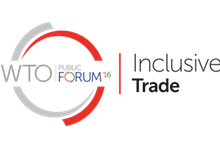Connecting the world through digital trade
28 Sep 2016 09:00h - 10:30h
Event report
[Read more session reports and live updates from the 2016 WTO Public Forum.]
The session, organised by BusinessEurope, sought to explore emerging issues in digital trade and highlighted the place of national legislators in the process.
Jonathan T. Fried, Ambassador and Permanent Representative of Canada to the WTO, underlined that the digital economy is not only about big companies such as Google or Facebook, but it is even more important to focus on every sector of goods or services. He noted that e-commerce as a concept goes beyond the sale of goods and services online and that we should distinguish what is really trade related. He also mentioned that there are other issues to be aware of, including the regulatory framework.
One the most highlighted topics during the session was indeed the potential provisions that might be considered at the WTO that would facilitate the development of e-commerce and promote an open market. According to Hosuk Lee-Makiyama, Director of the European Centre for International Political Economy (ECIPE), digitalisation and globalisation are the two main challenges for regulators. He defined the data flow as ‘a conduit of delivery trade’ that is mainly defined by national jurisdictions considering that trade law, including GATT (General Agreement on Tariffs and Trade), does not replace domestic regulation.
Junichi Ihara, Ambassador and Permanent Representative of Japan to the International Organisations in Geneva, underlined that digital trade is supported by innovation. Therefore, policymakers must take into account technologies and understand them properly in order to promote possibilities for creating new businesses. He also underlined that the digital economy should be implemented increasingly in developing countries. Although financing is essential in developing countries, some still lack effective banking systems, systems that should be efficient before new businesses are created.
Emmanuelle Butaud-Stubbs, Director General of the Union des Industries Textiles de France & Medef (UIT), provided an overview of the different positions of Medef on digital trade including a necessary international cooperation and the protection of a company’s ability to innovate. As an example, she mentioned the textile industry that needs to be protected against counterfeiting in a broader dimension even though she recognised that digital trade is an important opportunity for small companies to have access to the world and to reduce costs. She also mentioned the role of a policymaker and the importance of the WTO catching ‘this key evolution of trade’. From this perspective, Butaud-Stubbs noted some slack regarding the interpretation that should be given to some provisions of GATT treaties. Indeed, she fears that an important number of government initiatives in this matter could lead to fragmentation, which would complicate the digital economy.
Finally, Victor Do Prado, Director of the Council and Trade Negotiations Committee Division at the WTO, mentioned the huge digital divide across the world as regards access to the Internet. He also mentioned the importance of soft and hard infrastructures for those who are not very connected to the Internet. He concluded the session thus: ‘Trade will only be inclusive if all of these people and governments feel that they are included in this world.’
by Ana Andrijević
Related event

